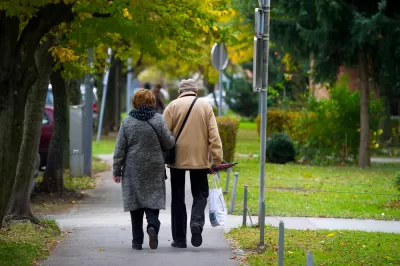Around two-thirds of Baby Boomers in metropolitan areas live in the suburbs. But as they age, suburbia seems less and less hospitable.

The iconic "car-centric suburban neighborhoods with multilevel homes and scarce sidewalks are a poor match for people who can’t climb stairs or drive a car," writes Jenni Bergal for RenewATL.
That means that for many Baby Boomers hoping to age in place, staying in their homes could mean suffering increased isolation and immobility—both of which can be damaging to mental health.
And for the many retirees underwater on their mortgages, leaving may not be an option.
The problem, which many seniors already face, highlights larger failures in infrastructure management throughout the country. And government may not be able to keep up:
State and local officials are largely unprepared to handle heightened demands for transportation, affordable housing and long-term care. One study estimated that spending on public transit would have to increase 81 percent, to $8.6 billion, by 2030 to meet the needs of seniors who want to stay in their homes.
FULL STORY: Can car-centric suburbs adjust to aging Baby Boomers?

Planetizen Federal Action Tracker
A weekly monitor of how Trump’s orders and actions are impacting planners and planning in America.

Map: Where Senate Republicans Want to Sell Your Public Lands
For public land advocates, the Senate Republicans’ proposal to sell millions of acres of public land in the West is “the biggest fight of their careers.”

Restaurant Patios Were a Pandemic Win — Why Were They so Hard to Keep?
Social distancing requirements and changes in travel patterns prompted cities to pilot new uses for street and sidewalk space. Then it got complicated.

Platform Pilsner: Vancouver Transit Agency Releases... a Beer?
TransLink will receive a portion of every sale of the four-pack.

Toronto Weighs Cheaper Transit, Parking Hikes for Major Events
Special event rates would take effect during large festivals, sports games and concerts to ‘discourage driving, manage congestion and free up space for transit.”

Berlin to Consider Car-Free Zone Larger Than Manhattan
The area bound by the 22-mile Ringbahn would still allow 12 uses of a private automobile per year per person, and several other exemptions.
Urban Design for Planners 1: Software Tools
This six-course series explores essential urban design concepts using open source software and equips planners with the tools they need to participate fully in the urban design process.
Planning for Universal Design
Learn the tools for implementing Universal Design in planning regulations.
Heyer Gruel & Associates PA
JM Goldson LLC
Custer County Colorado
City of Camden Redevelopment Agency
City of Astoria
Transportation Research & Education Center (TREC) at Portland State University
Camden Redevelopment Agency
City of Claremont
Municipality of Princeton (NJ)




























